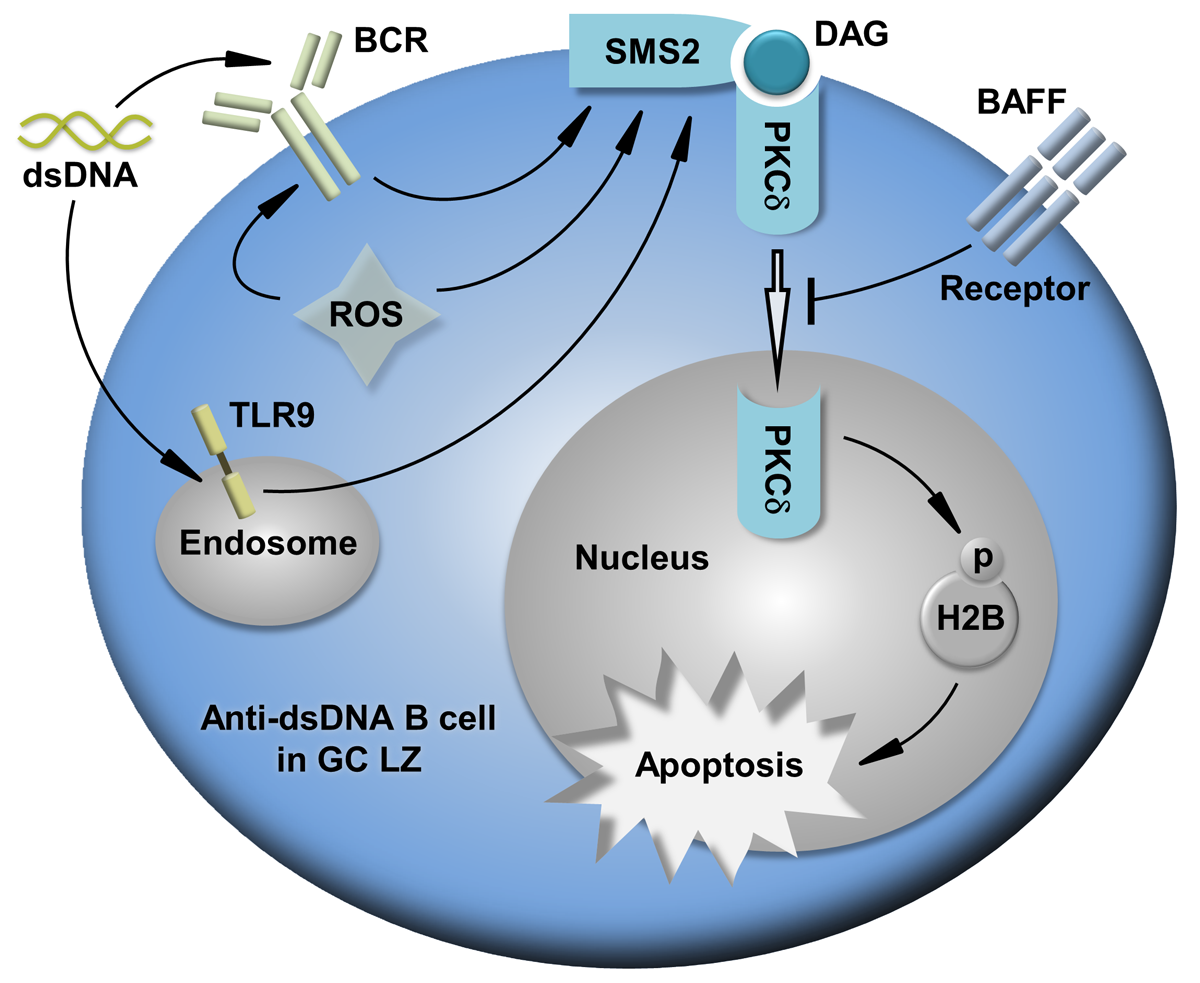
Chongmin Huan, MD, PhD
Assistant Professor
Research Description
Our team of researchers, which includes Ms. Sailee Chavan (PhD student), Ms. Shreya Desikan (MD/PhD student), Dr. Christopher Roman (Cell Biology), Dr. Ellen Ginzler (Medicine: Rheumatology) and myself, has a keen interest in the causes of autoimmune diseases and developing more effective treatments for them. We are using genetically modified mouse models and human samples to study the self-protective mechanisms of B cell tolerance that guard against systemic lupus erythematosus (lupus), an autoantibody-mediated disease that remains a serious clinical challenge.
We focus on the immune tolerance role of sphingomyelin synthase 2 (SMS2), an enzyme that produces sphingomyelin and diacylglycerol on the plasma membrane. We have reported that SMS2 prevents lupus pathogenesis in mice by activating a B cell tolerance mechanism in the germinal center, where random somatic hypermutation of immunoglobulin genes naturally generates lupus autoreactive B cells at a low frequency. In the normal germinal center, we showed that SMS2 is highly upregulated specifically in these lupus autoreactive B cells, where it triggers cell death via activating the pro-apoptotic function of protein kinase C delta (PKCd) by providing diacylglycerol (see figure and our publication). Evidence that this is a critical tolerance mechanism that protects against lupus includes: SMS2 or PKCd deficient mice exhibit a lupus-like phenotype; lupus patients’ B cells have substantially reduced SMS2; and mutations in PRKCD, the gene encoding PKCd, cause lupus autoimmunity in humans. Notably, pharmacologic activation of SMS2 attenuates lupus pathogenesis in NZBWF1 mice, the gold standard preclinical murine lupus model. Therefore, the SMS2/PKCd tolerance pathway appears to be essential and targetable for protecting against lupus pathogenesis in mice.
Currently, we are studying how SMS2/PKCd tolerance pathway becomes impaired in patients with lupus and the role of this tolerance pathway in the mechanisms of action of existing medications used to treat lupus. We believe that these studies may lead to breakthroughs in our understanding of the underlying drivers of autoimmune disease and help develop new and more effective treatments.

Figure: An illustration of the pro-apoptotic SMS2/PKCd pathway in a lupus anti-dsDNA GC B cell (adapted from Ou et al, Cell Reports 2021 Aug 31;36(9):109624. Article Link).
- Desikan SA, Chavan S, Ou P, Roman CAJ, Huan C. A MACS protocol for purification of untouched germinal center B cells from unimmunized or germinal center-induced mice. STAR Protoc. 2022 Jun 17;3(2):101388. doi: 10.1016/j.xpro.2022.101388. eCollection 2022 Jun 17. PubMed PMID: 35600926; PubMed Central PMCID: PMC9117920.
- Ou P, Stanek A, Huan Z, Roman CAJ, Huan C. SMS2 deficiency impairs PKCδ-regulated B cell tolerance in the germinal center. Cell Rep. 2021 Aug 31;36(9):109624. doi: 10.1016/j.celrep.2021.109624. PubMed PMID: 34469734.
- Edwards JA, Tan N, Toussaint N, Ou P, Mueller C, Stanek A, Zinsou V, Roudnitsky S, Sagal M, Dresner L, Schwartzman A, Huan C. Role of regenerating islet-derived proteins in inflammatory bowel disease. World J Gastroenterol. 2020 Jun 7;26(21):2702-2714. doi: 10.3748/wjg.v26.i21.2702. Review. PubMed PMID: 32550748; PubMed Central PMCID: PMC7284176.
- Gupta G, Baumlin N, Poon J, Ahmed B, Chiang YP, Railwah C, Kim MD, Rivas M, Goldenberg H, Elgamal Z, Salathe M, Panwala AA, Dabo A, Huan C, Foronjy R, Jiang XC, Wadgaonkar R, Geraghty P. Airway Resistance Caused by Sphingomyelin Synthase 2 Insufficiency in Response to Cigarette Smoke. Am J Respir Cell Mol Biol. 2020 Mar;62(3):342-353. doi: 10.1165/rcmb.2019-0133OC. PubMed PMID: 31517509; PubMed Central PMCID: PMC7055695.
- Huan C, Stanek A, Mueller C, Ou P, Dong S, Zhang J, Abdel-Naby R, Gruessner R. Loss of Reg proteins’ protection of islet β cells in chronic pancreatitis: A potential mechanism for the pathogenesis of Type 3c diabetes. Current Opinion in Endocrine and Metabolic Research. 2019 February. doi: 10.1016/j.coemr.2019.02.005.
- Barrera K, Stanek A, Okochi K, Niewiadomska Z, Mueller C, Ou P, John D, Alfonso AE, Tenner S, Huan C. Acinar cell injury induced by inadequate unfolded protein response in acute pancreatitis. World J Gastrointest Pathophysiol. 2018 Sep 29;9(2):37-46. doi: 10.4291/wjgp.v9.i2.37. Review. PubMed PMID: 30283709; PubMed Central PMCID: PMC6163129.
- Li Z, Kabir I, Tietelman G, Huan C, Fan J, Worgall T, Jiang XC. Sphingolipid de novo biosynthesis is essential for intestine cell survival and barrier function. Cell Death Dis. 2018 Feb 7;9(2):173. doi: 10.1038/s41419-017-0214-1. PubMed PMID: 29415989; PubMed Central PMCID: PMC5833386.
- Li Z, Kabir I, Jiang H, Zhou H, Libien J, Zeng J, Stanek A, Ou P, Li KR, Zhang S, Bui HH, Kuo MS, Park TS, Kim B, Worgall TS, Huan C, Jiang XC. Liver serine palmitoyltransferase activity deficiency in early life impairs adherens junctions and promotes tumorigenesis. Hepatology. 2016 Dec;64(6):2089-2102. doi: 10.1002/hep.28845. PubMed PMID: 27642075; PubMed Central PMCID: PMC5115983.
- Huan C, Kim D, Ou P, Alfonso A, Stanek A. Mechanisms of interleukin-22's beneficial effects in acute pancreatitis. World J Gastrointest Pathophysiol. 2016 Feb 15;7(1):108-16. doi: 10.4291/wjgp.v7.i1.108. Review. PubMed PMID: 26909233; PubMed Central PMCID: PMC4753176.
- Chakraborty M, Lou C, Huan C, Kuo MS, Park TS, Cao G, Jiang XC. Myeloid cell-specific serine palmitoyltransferase subunit 2 haploinsufficiency reduces murine atherosclerosis. J Clin Invest. 2013 Apr;123(4):1784-97. doi: 10.1172/JCI60415. Epub 2013 Mar 15. PubMed PMID: 23549085; PubMed Central PMCID: PMC3613902.
- Li Z, Fan Y, Liu J, Li Y, Huan C, Bui HH, Kuo MS, Park TS, Cao G, Jiang XC. Impact of sphingomyelin synthase 1 deficiency on sphingolipid metabolism and atherosclerosis in mice. Arterioscler Thromb Vasc Biol. 2012 Jul;32(7):1577-84. doi: 10.1161/ATVBAHA.112.251538. Epub 2012 May 10. PubMed PMID: 22580896; PubMed Central PMCID: PMC3444302.
- Liu J, Huan C, Chakraborty M, Zhang H, Lu D, Kuo MS, Cao G, Jiang XC. Macrophage sphingomyelin synthase 2 deficiency decreases atherosclerosis in mice. Circ Res. 2009 Jul 31;105(3):295-303. doi: 10.1161/CIRCRESAHA.109.194613. Epub 2009 Jul 9. PubMed PMID: 19590047; PubMed Central PMCID: PMC2746935.
- Hailemariam TK, Huan C, Liu J, Li Z, Roman C, Kalbfeisch M, Bui HH, Peake DA, Kuo MS, Cao G, Wadgaonkar R, Jiang XC. Sphingomyelin synthase 2 deficiency attenuates NFkappaB activation. Arterioscler Thromb Vasc Biol. 2008 Aug;28(8):1519-26. doi: 10.1161/ATVBAHA.108.168682. Epub 2008 Jun 19. PubMed PMID: 18566297.
College of Medicine:
- Histology
- Physiology:
- Small intestine & Pancreas
- Carbohydrate, Water and Electrolyte Absorption
School of Graduate Studies, Program in Molecular and Cellular Biology:
- Principal Investigator/Graduate Student Supervisor